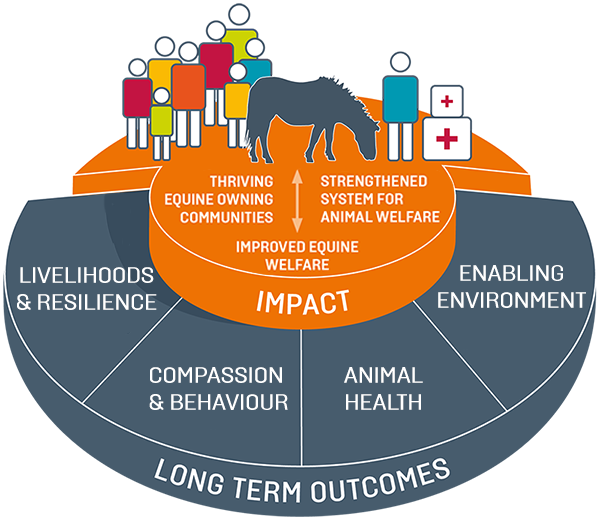Brooke theory of change
Our Theory of Change is how we believe change happens in the world.
In order to sustainably improve equine welfare we recognise the complex interaction between the equine, the equine owning communities, and the system within which they co-exist. We believe that change to human behaviour needs to happen at all levels in order achieve transformational change for the equines and the communities that rely on them for their livelihoods.
The following animation gives a brief introduction to Brooke’s Theory of change. It also shows how this way of working has helped us achieve real positive change for working horses, donkeys and mules.
Also make sure to watch the related videos at the end:
- Livelihoods and resilience: a snapshot of life for people in Kenya who’ve been affected by the trade in donkey skins
- Compassion and behaviour: learn about how we help owners to handle their animals with care and compassion, meaning a happier working life for working horses, donkeys and mules
- Animal health: imagine trying to work with your feet in constant discomfort. Thomas Burch, a U.K farrier working with Brooke, explains how well trained animal health providers provide a vital service to animal owning communities
- Policies that protect animal welfare: Frances Goodrum, Brooke’s Global External Affairs Manager talks through Brooke’s work with OIE, the World Organisation for Animal Health.
Working together to make change happen
Working horses, donkeys and mules are an essential part of sustainable development and measurably contribute to many of the Sustainable Development Goals. Recognised by the UN as ‘working livestock’, equine animals support the daily lives and livelihoods of over 600 million people living in some of the world’s poor and most vulnerable regions.
A largely unsupported livestock group, working equines contribute much to household livelihoods, agricultural systems, female empowerment and local economies. Working equines are often a critical asset for communities to recover from disasters and emergencies. Within this context, Brooke’s expertise improves working equine animal welfare, enabling equine-owning communities to thrive.
The interrelationship and interdependence of animal welfare, human well-being and the environment in achieving sustainable positive change is articulated as the One Welfare concept.
Farming is made possible by donkeys. All household animals rely on donkeys which are the ones carrying and bringing feed and water for cows, chickens, sheep and goats.
Impact area 1: improved equine welfare
Brooke’s vision is that working equine animals are free from suffering and thus ‘improved equine welfare’ sits at the foundation of our theory of change. Thriving equine communities and a strengthened animal welfare system create the necessary conditions for sustained improvements in equine welfare.
Brooke recognises that all equine animals will have appropriate nutrition and water, a comfortable environment, health treatment, positive behaviours, positive interactions and mental state. Under these conditions, equine animals deliver more for their owners and communities.

Download a PDF version of this infographic
Equine-owning communities must thrive for the needs of both people and animals to be adequately met. Such a community will be equipped with knowledge, skills, resources and agency to fully enjoy their rights, build resilience and look after themselves, their family and their animals. ‘Improved equine welfare’ and ‘thriving equine owning communities’ are mutually reinforcing as improved equine welfare enables an equine owning community to thrive through strengthened livelihoods strategies.
Our living is primarily dependent on equines and if we don’t take care of their needs our family cannot survive.
See also
Farming the land brings together a group of donkey owners and helps the welfare of the town's donkeys.
In Samathal Village in Utter Pradesh, women are establishing groups to increase their skills and knowledge of equine welfare.
When ESAP provided a water pump, the whole community got involved in this project to improve access to water.
South East Asia is thought to have around 89% of the world’s ‘bonded labour’. An estimated 15% are working in brick kilns.
The donkey affects every aspect of my life as a woman. On a typical day the donkey fetches water for the laundry, the dishes and for bathing. It also fetches fuel to cook with, before I hire it out for an income that I use to buy flour for the evening meal. In other words, I eat, drink, dress and live off the donkey.
Impact area 3: strengthened animal welfare systems
A strengthened animal welfare system includes improved healthcare systems, increased consumer demand for quality services and legislation in place to effect implementation and uptake. Brooke ensures sustainability by strengthening animal welfare systems in general while ensuring the specific needs of equine species are included.
See also
Broooke helps a traditional farrier learn new ways of working.
Brooke is taking the lead in this “sharing and building expertise” approach to improving animal healthcare systems.
Working in the field, we sometimes come across mistaken beliefs which are adversely affecting animal welfare.
